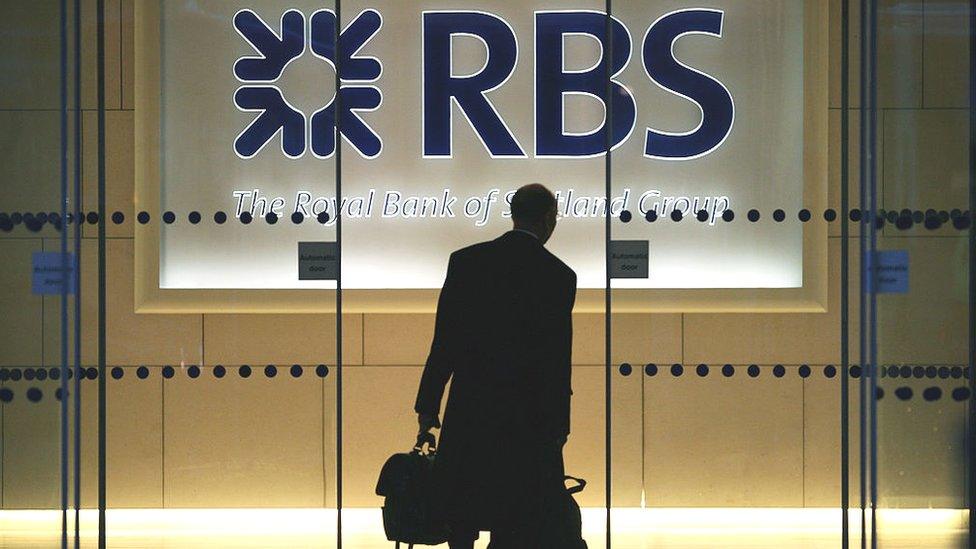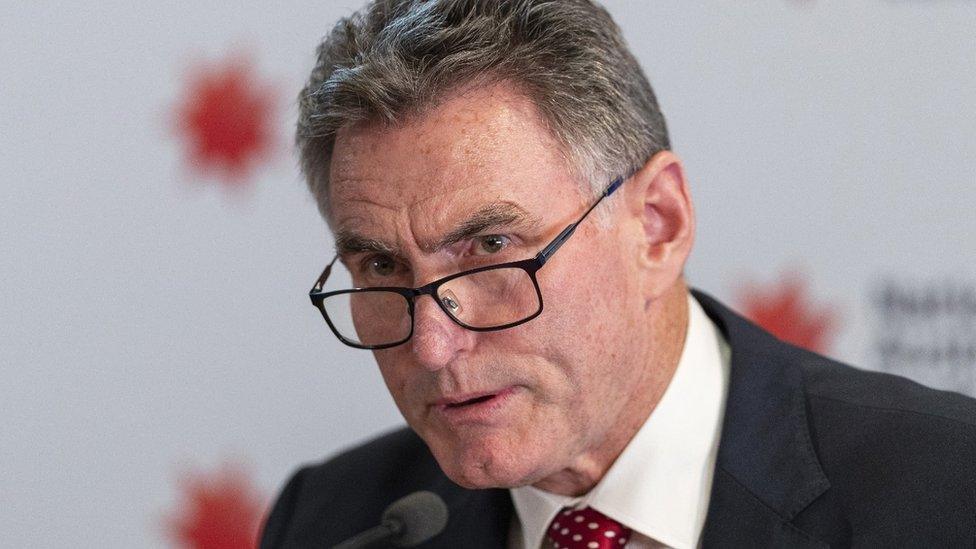Royal revolutionaries, digital disrupters
- Published

Royal Bank of Scotland has learned to be relaxed about the political storms around it.
It says removing its brass plate from Edinburgh if Scotland becomes independent is something that ministers should want.
Despite uncertainty, bank bosses continue to look to Scottish know-how in the sector, including non-Scottish banks.
RBS has emerged as one of the top adopters of new technology, and is launching newly-branded services aimed at exploiting developments in financial technology, or fintech.
Ross McEwan could remain chief executive of Royal Bank of Scotland until next April, depending when and how directors select his successor.
That leaves his media minders with a challenge in the meantime - how to rein his straight-talking Kiwi instincts, avoiding controversy.
They took a risk this week, hosting an on-the-record dinner with a group of Scottish journalists - and in a distillery, too.
The boss's candour was refreshing, as it has often been through his years at the helm.
He spoke clearly about the two political questions that have been a feature of those years.
One was Brexit. The economy will slow, he said. No doubt. He subscribes to Mark Carney's views. With one of the best-informed views of corporate Britain through its business customer base, RBS continues to find the larger corporates unwilling to invest due to uncertainty.
But in the end, things will work out, says McEwan, but he wasn't saying how long that will take. He will long since have departed for Melbourne, for his new job in charge of mopping up the unhappy ship that was the once-dominant National Australia Bank.

Ross McEwan could remain chief executive of Royal Bank of Scotland until next April
The chief executive didn't quite say the same about Scottish independence - it'll work out in the end - but he was taking a shorter time horizon.
Yet again, we were reminded that RBS would remove the brass plate from Edinburgh and install it in London.
It's simply too big for Scotland to take on the burden of a bank that big, McEwan explained. It has only a third of the assets it had when it nearly collapsed in 2008, but at around £730bn, it is too big for a country of Scotland's size to rescue.
Moving the registered office south of the Border would be what the government of a newly independent Scotland would want, he observed. "It's too big."
Not many jobs would go - even if they might be rather significant jobs. "As long as things stay competitive here - that we can get talented people and they want to work here... there would be not much change," said McEwan.
Finance know-how
Contrary to the risk that constitutional upheaval could thin out the financial sector in Scotland, employment has remained strong.
The grand Gogarburn HQ in west Edinburgh has been a magnet for internal movement of jobs and activities. It is in London that RBS has shrunk five large office blocks to only one.
RBS is one of several banks to have pushed jobs out of London, and Scotland has been a big gainer with useful bank office functions.
The structure for a 5,000-role Barclays office, on the south side of the Clyde, is on the rise, and beginning to look impressively large. It has chosen Glasgow as one of three global hubs, along with India and the US. The Scottish workforce is doubling, as other offices are closed and jobs lost.

So it is not only the big Scottish banks that use Scots' financial services know-how. And with constitutional uncertainty for both Britain and Scotland, they aren't showing signs of pulling back.
RBS, however, has some way to go on cutting its cost base to fit the scale of a bank that is 90% focused on the UK and Ireland. The cost:revenue ratio has fallen - aided, to a small extent, by those controversial branch closures - but is still north of the 50% target, without much immediate prospect that the revenue part of that equation is about to help.
Margins are tight, particularly on mortgages. Most of the major banks have been reporting as much in recent days.
CYBG, including Clydesdale and Virgin Money, reported on that last week. It was RBS that took the biggest hit to its already soggy share price, even as it handed shareholders £1.7bn in a special dividend.
Constitutional upheavals
So on politics, it should not be surprising that RBS would make such a change. The Sustainable Growth Commission, commissioned by the SNP and chaired by Andrew Wilson, conceded that the bank registrations would depart.
While continuing to use sterling, and making no claims on joint control of the currency - as Alex Salmond sought in the 2014 referendum campaign - that report said that the banks could be expected to take their registrations south.
The bank's relaxed outlook on constitutional upheavals is perhaps because it has become so disruptive in itself.
It continues to struggle with the negative ratings for the Royal Bank of Scotland brand. NatWest, which is all you're likely to notice south of the border, is much more favourably viewed by its customers.
McEwan observes Scots have a love-hate relationship with their Royal Bank. With great pride until 2008, the country was heavily invested in the prestige of its success.
Its humiliation hurt, but woe betide the brand consultant who thinks 'Royal Bank of Scotland' should be ditched. (Clydesdale Bank has chosen to take the route of ditching that historic name. Customers have recently been informed that they are going fully Virgin Money.)
Tyl ringing
One of the solutions is to create new brands, attached to new banking concepts, and possibly to spread away from the tainted brands of a tainted past.
So if you haven't already met them, stand by for Mettle, Bo and Tyl, all offshoots of RBS, though perhaps not intended to look like it.
Mettle is a digital-only bank account for smaller companies, offering an app on which bank transactions can be handled, payments chased, and financials tracked.
Bo is expected to do something similar and digital-only for individual customers, providing freshly-branded competition to the disrupting newcomers such as Monzo.

RBS is soon to feel the heat of more than £750m of its own money being used against it. The amended deal with the European Commission on the price to be paid for state aid (splitting off the division known as Williams & Glyn was an expensive failure) is to give money to an independent fund, which will hand tranches of it to challenger banks, so they can poach big banks' customers.
In the early days of the state-bailed recovery programme, the European Commission forced RBS to sell its payment system, WorldPay.
Last May, RBS got back into the business of selling transactions and payments services to its business clients, under the Tyl brand.
This seeks to cut the percentage cut on each transaction, "putting money back into other people's pockets". With leaps and bounds being made in data handling since the split from WorldPay, its new RBS rival can harness amounts of information about each customer, at the point of the transaction.
Meanwhile, it is exploiting artificial intelligence to drive both internal staff communications and customer queries.

At Gogarburn, the former executive suite has been turned over to small-scale entrepreneurs and to financial innovation. On its doorstep in the Scottish capital is a thriving hub for fintech, or financial technology.
McEwan proudly cites a recent worldwide analysis that put RBS into the top eight large banks for adopting new technology, suggesting it's not what you would expect of a bank facing the difficulties that have recently beset RBS.
It's a sign that some of the big banks should be able to weather the fintech storm, if they understand it, invest in it and are willing to disrupt their own conservatism and business models.
They can wait until fintech eats into market share. Or they can partner small firms, and buy some. That helps put the big banks at the forefront of change, adapting what they've got to the new tech that's coming along.
They have the deeper pockets than venture capital, they have the regulatory understanding and the scale to operate IT systems at the level of security that customers and regulators require.
The big banks, and even RBS, may yet out-manoeuvre and outlive the fintech upstarts.
